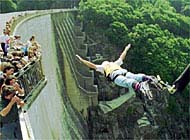Extreme sports highlight need for safety measures

The growing popularity of extreme sports in Switzerland has pushed safety concerns into the spotlight, and questions are being asked about the experience and training of the guides who take tourists into the mountains.
Concerns about safety surfaced last year, following a canyoning accident in the Bernese Alps, in which 21 people drowned during a flash flood.
At the time, there were accusations that the guides involved had made a serious error of judgement in going ahead with the trip despite forecasts of bad weather.
A second incident, in which an American tourist died after losing his way in the Alps, led to two guides receiving suspended prison sentences on charges of negligence.
Another American plunged to his death in May while bungee jumping near Interlaken. A subsequent investigation confirmed that the man had been attached to an elastic cable of the wrong length.
While the adventure sports business in Switzerland remains largely unregulated, the more traditional sport of mountain guiding does have some fairly strict rules.
The Swiss Mountain Guide’s Association requires a rigorous three-year training course for its members, involving courses in avalanche awareness, ice-climbing, and high altitude climbing. Would-be guides must also spend several weeks working as an assistant to an already qualified guide.
“This is a very difficult course,” says Wolfgang Woernhard, director of the Mountain Guide’s Association. “You can only get your diploma if you complete every section successfully.”
Several cantons, including Bern, Valais and Graubünden, will only permit guides to work professionally if they have a diploma. But in other cantons, such as Ticino or St Gallen, anyone can call themselves a mountain guide, whether or not they have done any training.
“This is a problem,’ says Bruno Hasler of the Swiss Alpine Club. “A tourist coming here from Japan, for example, has difficulty finding out if he has hired a certified mountain guide. Some people just call themselves mountain guides but have no professional licence.”
But things may be about to change. Both the Swiss Alpine Club and the Mountain Guide’s Association are pushing for a federal law which would require proper training and certification for all mountain guides.
Meanwhile canton Bern is drawing up a safety model for all extreme sports, in the wake of the canyoning disaster, and an accident in which a bungee jumper was killed after being attached to the wrong elastic cable. Supporters hope the model will be adopted by all of Switzerland’s cantons.
In the meantime, Hasler says the dangers should not be exaggerated. “There are 1,300 qualified mountain guides in Switzerland, and we believe that only a few operate without a licence.”
And Woernhard advises tourists to do a little bit of research themselves before choosing an activity, or a guide.
“Tourists should find out about the region they want to climb in, they should ask whether the guide they plan to hire has a license, and they should perhaps even ask for a written agreement about where to meet, what the route is, how much the fee is, and so on.”
by Imogen Foulkes

In compliance with the JTI standards
More: SWI swissinfo.ch certified by the Journalism Trust Initiative
You can find an overview of ongoing debates with our journalists here. Please join us!
If you want to start a conversation about a topic raised in this article or want to report factual errors, email us at english@swissinfo.ch.